 |
NEWS: April 16, 2005
Bird’s Eye View of the News
Atila Sinke Guimarães
WHAT IS THE MISSION OF THE NEXT POPE? - Some readers asked me to say a word on the future perspectives for the Church coming from the election of a new Pope. Since the Conclave will begin on April 18, I do not want the make them wait any longer.
To proceed with this analysis, it is good to have one premise clear. I have a different presupposition than many people. I believe that Progressivism has been dominating the Church since Vatican II, from the top down. The few conservative Cardinals from the Pius XII epoch have died. Any possibility that a new non-progressivist would be elected Pope was put to rest with the inflation of the number of Cardinals. The conciliar Popes only made those who followed the progressivist goals Cardinals. Pius XII maintained 70 Cardinals in the College, as it had been for centuries. In 1963, John XXIII raised the number to 85; at the end of Paul VI’s pontificate, it was 120; today it is 183; with 117 electors. Regarding a Conclave, this inflation dilutes any opposition to Progressivism.
For a simple priest to receive a celebret – permission for him to say the Tridentine Mass – the Vatican demands a written compromise in which he agrees to not criticize either Vatican II or the New Mass. One can imagine how many and profound the compromises a man has to make to receive a Cardinal’s hat. For this reason, I think that there is no one in the College of Cardinals who is not committed to Progressivism. And if by some odd chance one would pop up, he would not have any possibility to be elected Pope.
Therefore, to know what agenda the next Pontiff will have for the Church, it is my opinion that one should ask: What are the main interests of Progressivism today? Answering this question, he has a good chance of realizing what will happen. Let me apply this criterion.
1. Religious priority: To break the Papacy
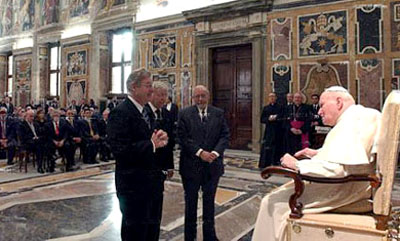
JPII greets some of the 160 rabbis during the last January meeting at the Vatican - L'Osservatore Romano online
|
An overview of the pontificate of John Paul II shows that both symbolically and concretely he did every progressivist thing he was told to do: from the swimming pool Cardinal Suenens suggested he build at the Vatican on the very day he was elected Pope, until his last symbolic act, the 160 rabbis he invited to the Vatican last January (click here for details) to make their perfidious prayers there and then “bless” him.
I sustain that JPII did the most he could to serve Progressivism. This is not the place to prove such an assertion. I think I have already sufficiently demonstrated it in my books (1), booklets (2), tapes, (3) and in many articles posted on TIA’s website.
Even though he was an enthusiastic disciple of John XXIII and Paul VI in applying Vatican II’s revolution to the Church, Wojtyla committed two crucial sins against Progressivism:
- He did not resign from the Papacy, as it was planned for him to do. Several times he threatened to do so, but he never did. Several times he was reminded that he must do so, but he did not listen.
- He did not reform the Papacy as he had promised. In Ut unum sint,
he wrote that he would do exactly that, but then he did not.
Ready to share the power...
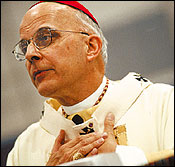
Cardinal George, US
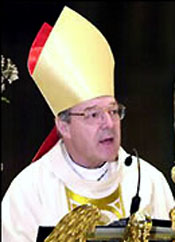
Cardinal George Pell, Australia
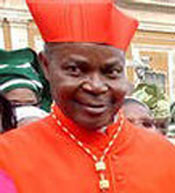
Cardinal Okogie, Nigeria
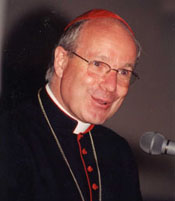
Cardinal Schonborn, Austria
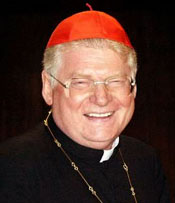
Cardinal Scola, Italy
|
The star loved the lights of the stage so much that he wanted to prolong his role as long as he could. An understandable weakness in an old theater man... A bad cold followed by unexplained fatal consequences (click here for details) would clear the road and allow Progressivism to return to its projected path.
What path is that? To break the Papacy by doing away with it as the principal symbol of Our Lord on earth, to abolish the monarchical Church, to eliminate major institutional differences between the Catholic Church and the Schismatic and Protestant sects.
How could they break the Papacy? By a reform in the institution of the Papacy. Instead of a strong monarch, a weak Pope would be chosen who would share his government with a small group of powerful quasi-pope Cardinals delegated by the College. This cluster of Cardinals would assume more and more power at the head of the Catholic Church in the various continents. One should not forget that in the last pontificate the malfunction of the world synod of Bishops – the failed dream of Paul VI – gave life to continental synods: the African Synod, the Oceania Synod, the Latin American Synod, etc. JPII used to travel to the continent to promulgate the conclusions of each synod. Certainly the next step would be to promulgate their conclusions with less and less of Rome’s tutelage. Regarding the new Papacy, I think that this is the plan. Increasingly stronger continental Churches, and a gradually less centralized and weaker Rome.
Where are the men for that job? A squad of young and energetic Cardinals are in the Conclave just waiting to be designated: George for North America, Hummes or Trujillo for Latin America, Anthony Okogie for Africa, Pell or Ivan Dias for Oceania and Asia together. And the Pope? If this is the plan that prevails, it should be a European. Why not Schönborn or Scola ? Either could take care of Europe and just supervise the others.
The artificial posthumous hubbub over Wojtyla – sponsored by the Vatican and the media – that presented him as an irreplaceable super-man does not fit with reality. In my view, it is a theatrical preparation for a plan already decided to be implemented – the fragmentation of the Papacy.
2. Temporal priority: To break the United States
I sustain that Progressivism is the tip of the lance of the Revolution today (click here for details). The Revolution, which is controlling the Papacy, uses it to serve its goals. It is for this reason that when the U.N. was breaking down, Paul VI and JPII visited its headquarters to increase its prestige. The same happened when Gorbatchev was on the point of falling. He went to Rome and was received by JPII with the most prestigious honors a head of State could receive. I could multiply the examples indefinitely.
Is there some particular obstacle in the way of the Revolution that would request a special action of a Pope? Yes, there is. It is the growing conservative and traditionalist reaction of American public opinion. Reactions against pedophilia and homosexuality of priests, “gay marriage,” abortion, euthanasia, a one-world government, as well as reactions favorable to the war against terrorism etc. After the last presidential election, the Democratic Party had to completely reanalyze its platform to better its chances for the next one. While public opinion in Europe is morally rotten and politically socialist, and Latin America is rapidly accepting Communism, Americans are becoming more and more conservative.
One of the many consequences of this phenomenon is that patriotism in the U.S. is growing. And the U.S. is proud to be a great country that does not care about facing the disdain of the West. In addition to having this huge conservative bull sleeping on the railroad tracks, the Revolution has another problem: the American example can easily arouse the admiration of other countries and make the revolutionary process stop in its tracks everywhere. This is a problem, for when the Revolution stops, it deteriorates, and if it deteriorates, it will die.
What can it do in face of this problem? The solution might be to elect a Pope that will destroy such a reaction in the U.S. and, doing so, allow the process to go ahead everywhere.
To resolve this problem, the next Pope must still be a strong Pope who is able to destroy such a reaction. He must also be able to break the strength of the U.S., which is too great and has become an obstacle for the planned One World Order with fragmented groups sharing powers.
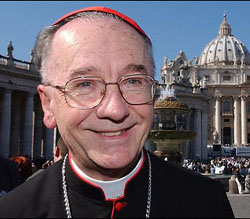
Claudio Hummes, a candidate to break the conservative reaction
|
Who would be the right man for this job? He would be the Cardinal who supports the growing Communism in Latin America. Further, the man who is one of the architects of this new Communism born from the Christian Basic Communities. The Prelate who has always been against American imperialism. I am talking about Brazilian Cardinal Claudio Hummes.
If this second priority prevails, he is the candidate most likely to be the next Pope.
It is my opinion that the outcome of this Conclave oscillates between these two priorities of the Revolution.
Some one might ask: What about the Holy Ghost? Don’t you think that He will be present in this Conclave?
It does not look like it. It does not seem His action would inspire the election of another St. Pius X, simply because there is no one close to a Cardinal Sarto among the candidates. It is my opinion that the Holy Ghost will not act inside the Conclave. Perhaps He will act in another surprising way outside of the Conclave. I hope and pray that He will do so. If not, we will have to bear another time.
1. In the Murky Waters of Vatican II, Animus Delendi I, Animus Delendi II, Quo Vadis Petre?, We Resist You to the Face (with John Vennari, Michael Matt & Marian Horvat), An Urgent Plea: Do Not Change the Papacy (with the same authors), Previews of the New Papacy (with Marian Horvat), Vatican II, Homosexuality & Pedophilia.
2. "The Universal Republic Blessed by the Conciliar Popes," "Curious Affinities Between the Thinking of John Paul II and Marxism," "Petrine Primacy Challenged," "The End of the Myth of Galileo," "The Biblical Commission on the Jews: Changes and New Anathemas," "Resistance versus Sede-Vacantism."
3. Revolution and Counter-Revolution, How to Stop the Conciliar Revolution, The Papal Monarchy After Vatican II, The Miserablist Church, Spotlight on Resistance.


Related works of Interest
|
News |
Home | Books | CDs
| Search | Contact Us
| Donate

© 2002- Tradition in Action, Inc. All Rights
Reserved
|
 |
|